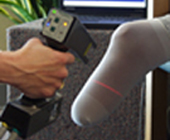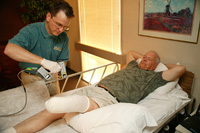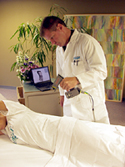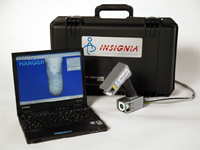Case Study: Polhemus 3D Laser Scanner Enables Perfect Prosthetic Fit
Hanger needed an alternative to the traditional plaster casting. Hanger and Polhemus teamed up to develop a 3D laser-scanning technology that would provide a faster, cleaner and less invasive alternative to traditional casting. The solution was FastSCAN.
 Headquartered in Bethesda, Maryland, Hanger Prosthetics & Orthotics, a division of Hanger Orthopedic Group, Inc (NYSE:HGR), owns and operates over 600 orthotic and prosthetic (O&P) patient care centers nationwide. Staffed by nearly 900 certified practitioners, Hanger Prosthetics & Orthotics provides patients with convenient, consistent, high-quality care.
Headquartered in Bethesda, Maryland, Hanger Prosthetics & Orthotics, a division of Hanger Orthopedic Group, Inc (NYSE:HGR), owns and operates over 600 orthotic and prosthetic (O&P) patient care centers nationwide. Staffed by nearly 900 certified practitioners, Hanger Prosthetics & Orthotics provides patients with convenient, consistent, high-quality care.
In the orthotics business, Hanger designs, fabricates, fits and maintains standard and custom-made braces that provide external support to patients suffering from musculoskeletal disorders and injuries from sports or other activities. In the prosthetics business, Hanger does the same for custom-made artificial limbs for patients who are without limbs as a result of traumatic injuries, vascular diseases, diabetes, cancer, or congenital disorders.
Hanger fits many proprietary technologies such as its patented ComfortFlex™ Socket, which combines science, technology, and anatomy to provide an intimate interface between the patient's body and the prosthetic device. Hanger's specialized patient care programs include International Upper Extremity and Lower Extremity Prosthetics, National Orthotics, Immediate Post-Operative Prosthetics (IPOP), and Diabetic Foot Management.
Traditional Method
Plaster casting is the traditional method of fitting custom orthotics and prosthetics. This procedure can be messy, time consuming, bothersome, and may also cause trauma associated with manipulating post-surgical spinal patients.
The fitting of devices on children, who can be afraid of the casting and cast removal procedures, is often stressful for both the patient and parents. For example, the cranial casting procedure, used in the creation of cranial helmets, requires the infant's head be wrapped in wet plaster, causing an irritating experience for infants and parents.
A Better Solution
 To enhance the overall patient treatment experience and ensure accurate orthotic and prosthetic devices, Hanger needed an alternative to the traditional plaster casting. Hanger and Polhemus teamed up to develop a 3D laser-scanning technology that would provide a faster, cleaner and less invasive alternative to traditional casting.
To enhance the overall patient treatment experience and ensure accurate orthotic and prosthetic devices, Hanger needed an alternative to the traditional plaster casting. Hanger and Polhemus teamed up to develop a 3D laser-scanning technology that would provide a faster, cleaner and less invasive alternative to traditional casting.
The three-dimensional laser scanner, developed by Polhemus and Applied Research Associates of New Zealand, exclusively for use by Hanger practitioners, named Insignia™, incorporates the same patented technology used by the United States Armed Services, which enables image capture of limbs, head or torso to occur in a rapid and accurate fashion for all patients in a variety of settings.
Insignia's compact, portable laser scanner works by casting a fan of laser light over the person's limb, head, or body, while the camera on the wand views the laser to record a cross-sectional profile of the object. To allow for patient movement during scanning, Insignia employs two embedded motion-tracking devices.
The practitioner attaches a small receiver to the patient, close to the area being scanned. This receiver works with the embedded motion-tracking device to determine the position and orientation of the scanner's wand, relative to the body part being scanned.
Using the Insignia scanning wand, the practitioner scans the part of the body being fit for a device. This is done by smoothly sweeping the handheld laser scanning wand over the body part, in a manner similar to spray painting, enabling the computer to reconstruct the full three-dimensional surface of the object within Hanger's proprietary CAD/CAM software.
The Result
Developed exclusively for Hanger, Insignia revolutionizes the process of fitting a patient for a prosthetic or orthotic device. Insignia's cutting edge technology, combined with Hanger's highly-skilled staff provides patients with highly accurate, well fitting devices, as well as significant improvements in comfort, convenience, and timesavings.
 Patients no longer have to endure the mess and bother associated with plaster casting. "Insignia is a big improvement over plaster casting. There is less mess and it's so fast and easy. Insignia is a wonderful method for making a prosthesis," says Gayle Dekker, a Hanger patient.
Patients no longer have to endure the mess and bother associated with plaster casting. "Insignia is a big improvement over plaster casting. There is less mess and it's so fast and easy. Insignia is a wonderful method for making a prosthesis," says Gayle Dekker, a Hanger patient.
For post-surgery patients, the Insignia scan requires little, if any, physical contact, and scanning can be performed on patients in bed. A unique symmetry feature used for post-surgical spinal patients allows the patient to be fit for a spinal jacket while lying in bed without having to roll from front to back. The Hanger practitioner scans one hemisphere of the body and the symmetry function built into the Insignia software creates the image of the opposite side to form a complete image.
This cutting edge technology ensures consistently accurate custom fitted devices. "My socket had a better fit than what I had before, especially around the knee," says Ken Hammer, a Hanger patient.
The scans are accurate to within one millimeter and the three-dimensional feature gives detailed surface information often lost with a cast or mechanical digitizer.
 Insignia's proprietary CAD software creates a permanent patient record that allows for rapid refitting and adjustments, the justification of medical necessity for a new device, and better patient/physician information exchange.
Insignia's proprietary CAD software creates a permanent patient record that allows for rapid refitting and adjustments, the justification of medical necessity for a new device, and better patient/physician information exchange.
The components of Insignia required to capture the patient's image – the laser wand, laptop, and motion-tracking devices – all fit into a compact, portable case that is smaller than a standard carry-on piece of luggage.
Conveniently, patients who cannot travel to a Hanger patient care center can be scanned at home, in the hospital, or in a nursing home/rehabilitation facility.
Created to design an array of prosthetic and orthotic devices, Insignia is currently being used by Hanger practitioners for the following devices:
- Post-op, preparatory, temporary and permanent protheses for foot, below-knee and above-knee amputees
- Functional and passive protheses for hand, below-elbow, and above-elbow amputees
- Ankle foot orthoses, spinal jackets and cranial helmets
Learn More:
- FastSCAN
- Download PDF
- Contact sales@polhemus.com for more information.
- For more information on Hanger, please call 1-877-4HANGER or visit: www.hanger.com

